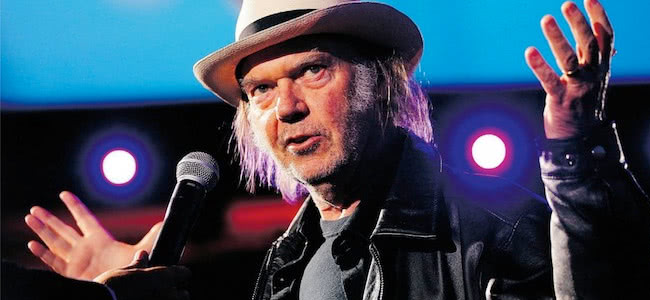Production of Neil Young’s highly anticipated hi-def iPod killer, Pono, could be imminent as the Canadian rocker was spotted meeting with Meridian, an audio manufacturer well known for focusing on audio fidelity and producing high quality audio systems.
Young, a passionate campaigner for hi-res music who launched Pono last year promising to ‘rescue an art form’, met with Meridian founder Bob Stuart to talk about his quest fuelling speculation that the two may be planning to work together on the commercial development of Pono.
According to What Hifi, as well as the meeting with Stuart, Young was taken on a tour of the manufacturing facilities and shown a demonstration of Meridian systems, including a session in the Meridian Digital Theatre, a visit to the company’s new Experience Centre, and a ride in a Meridian-equipped Range Rover Vogue.
With the rapid decline in physical album sales, the rise of music streaming service Spotify in Australia, the announcement that digital album sales are set to break last year’s record of 1.3 billion copies sold in the US, and that for the first time ever, sales from downloads were greater than those of CDs and vinyl in the first quarter of the year over in England, there is certainly a lot of conjecture over the current state of the music market worldwide.
But according to some analysts, digital sales growth has flatlined ever since Apple’s iPod sales began to cool. “As soon as iPod sales slowed, so did the digital music market,” said top industry analyst Mark Mulligan.
He identifies that in 2008 the digital music market had grown by an average annual rate of 85.2%, but this rate dropped to 7.5% following 2008, which directly correlates with a halt in the growth of iPod sales post-2008, signalling a dire decline in the digital market.
Mulligan claims that “in many markets the 2009 slowdown was of falling-off-a-cliff proportions: in the US digital growth slipped from 30% in 2008 to a near flat-lining 1% in 2009”. Mulligan says that to resurrect sales growth, the industry needs “another iPod moment”, something Young is no doubt hoping to create with the launch of Pono.
Appearing on The Late Show with David Letterman last year, Young unveiled his digital music player Pono and announced his intention to launch the player sometime this year. Pono will offer a music download store, a line of portable music players, but most importantly, a revolutionary approach to the way we listen to our favorite tracks.

Young has been busy developing a high-resolution portable music device for fans of analogue quality sounds, with practicality being the key feature. The device will enable users to convert their digital music catalogue into high quality analogue tracks, with the intention to bring listeners the true sounds of the recordings, fresh from the studio. Fitting nicely into the pocket, the Pono is out to combat the monopoly currently held by portable music giant, the iPod.
But this was not always Young’s intention. Rolling Stone reports Young to have approached Apple with the concept of providing fans with high quality tracks. “I have consistently reached out to try to assist Apple with true audio quality, and I have even shared my high-resolution masters with them.”
Young said that he traded emails and phone calls with Apple CEO Steve Jobs about Pono before the tech king’s death last October. Apple declined to comment on whether a collaborative or competitive relationship with Pono exists.
While Young acknowledges in his new memoirs, Waging Heavy Peace – so named from a response Young gave to the question of whether he was declaring war on Apple – that current digital media will play on Pono devices, he did outline that his service “will force iTunes to be better and to improve quality at a faster pace.”
Young’s development team consisted of numerous analogue music enthusists, including Craig Kallman, chairman of Atlantic Records. The pair came together in mid-2011 to start developing the product and since then has gained a large industry following.
The industry heavyweight has already signed on for the Pono project, with other record company competitors sitting up and taking notice, most interestingly two more of the ‘big four’, Sony and Universal.
Warner Music Group currently has over 8,000 songs, transferred from high quality analogue tracks on standby, awaiting the arrival of the Neil Young’s new digital music player.

































